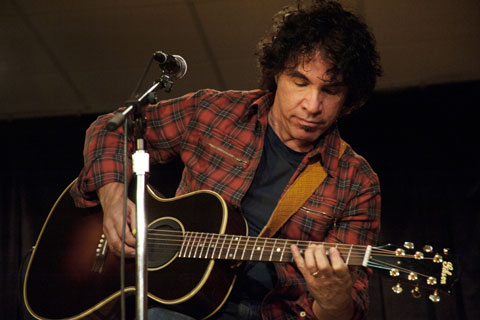
ONE MAN CLAPPING John Oates shared tales of the music industry and his days in Hall and Oates last week at Berklee. |
"The secret of a handclap is to only move one hand," John Oates said Friday, addressing a group of Berklee students. "If everyone is moving their hands, they'll never do it together."He demonstrated his technique. Holding his right hand stationary — though he plays right-handed guitar, Oates favors his left — he began to sing: "Private eyes [clap] are watching you [clap-CLAP]." The students nodded along.
The swarthy half of Hall and Oates, en route to a gig in Foxborough, was teaching a two-hour clinic. Standing students lined the back of the small auditorium. A number waited at the door for seats to open up. "Hall and Oates have become the darlings of the young generation," he said, smirking.
Oates stood onstage with his acoustic guitar, a bottle of Aquafina, and the black, curly mop he's maintained since the '70s. Notably absent: the mustache. Although he lost it over a decade ago, the sight of a clean-shaven Oates remains a bit jarring.
The songs he played were anything but. Over the course of two hours, Oates treated those assembled to solo, acoustic versions of "You Make My Dreams" and "Mississippi Mile," the title track off his new solo record. He hummed the bass line of "I Can't Go For That (No Can Do)," thumping the rhythm on his chest. The audience sang along to his soulful cover of Curtis Mayfield's "It's All Right."
He rose from his stool to play "She's Gone," Hall and Oates's first number-one single. "The sad part is, I'm the same height with the stool," he quipped.
Berklee guitar student Yusuke Sato sat in the front row. In 2009, he and his classmates at Shorewood High in Shoreline, Washington, shot a music video of Hall and Oates's "You Make My Dreams," performed in reverse. The students' backwards lip-synching — particularly Sato's reverse guitar solo — caught the attention of the international press and won over a million hits on YouTube.
When Sato announced himself, Oates appeared genuinely awed. "That was you?" he asked. "Cool!"
He handed Sato a CD of Mississippi Mile.
When he wasn't singing or passing out CDs, Oates regaled those assembled with anecdotes and hard-won lessons from the frontlines of the biz. He instructed the young musicians to be wary of the music industry — Hall and Oates had given up future royalties for instant cash. "There's this guy named Tommy Mottolla," he explained. The audience booed.
Oates recalled the afternoon he was doing a sound check for a show at Madison Square Garden when a young girl ran up to him with a cassette tape and darted away. On it was De La Soul's "Say No Go," which samples the riff from "I Can't Go for That (No Can Do)." Oates was delighted. "I love sampling," he said. "It's another evolution in pop music."
Oates admitted he'd like to play more shows, but Daryl Hall's tenuous health prevents them from doing so. Oates sympathizes. "I don't want to touch anyone," he said. "I'm this far away from rubber gloves. I don't want to be weird about it, but if I'm sick and I have to sing, it's a drag."